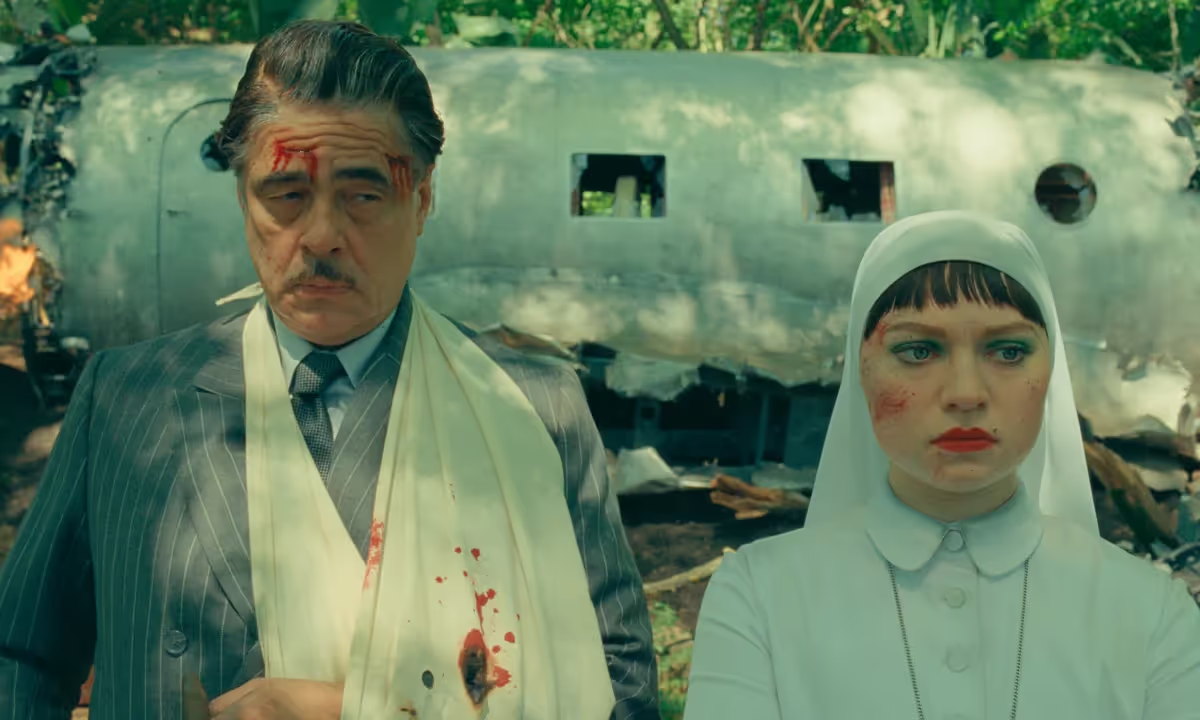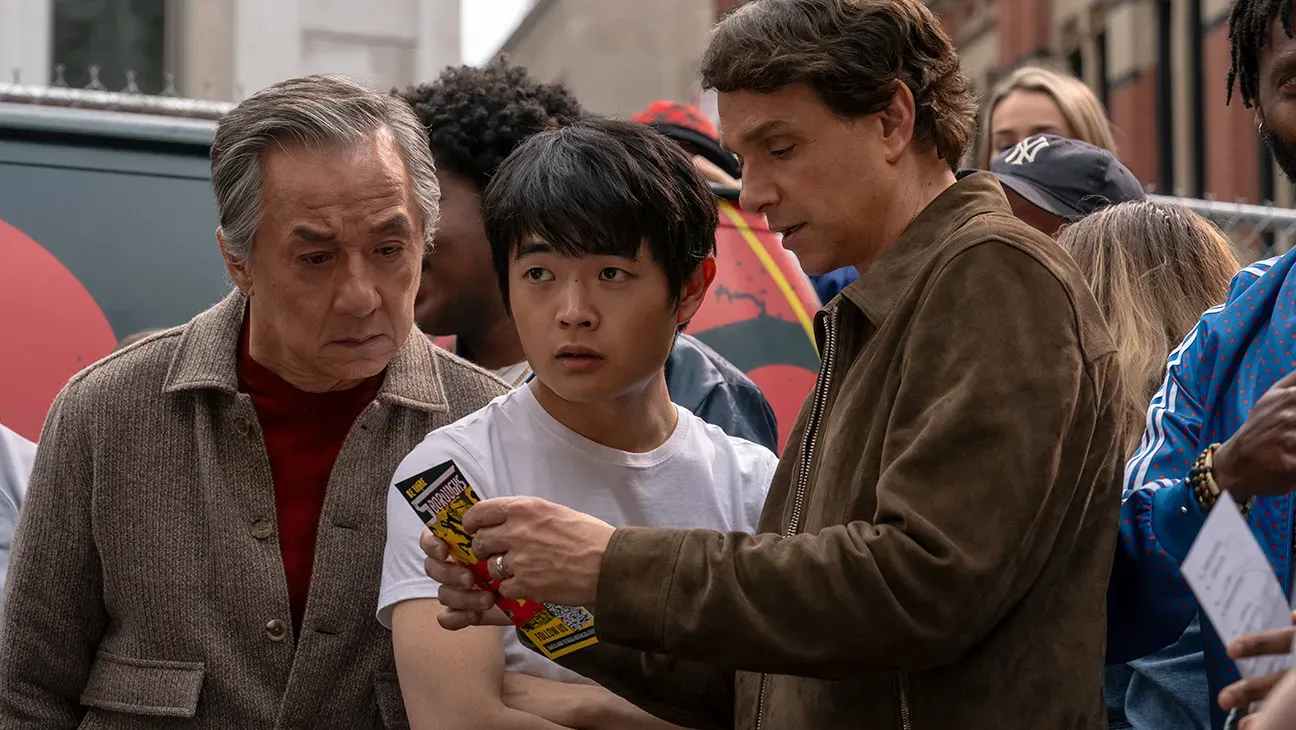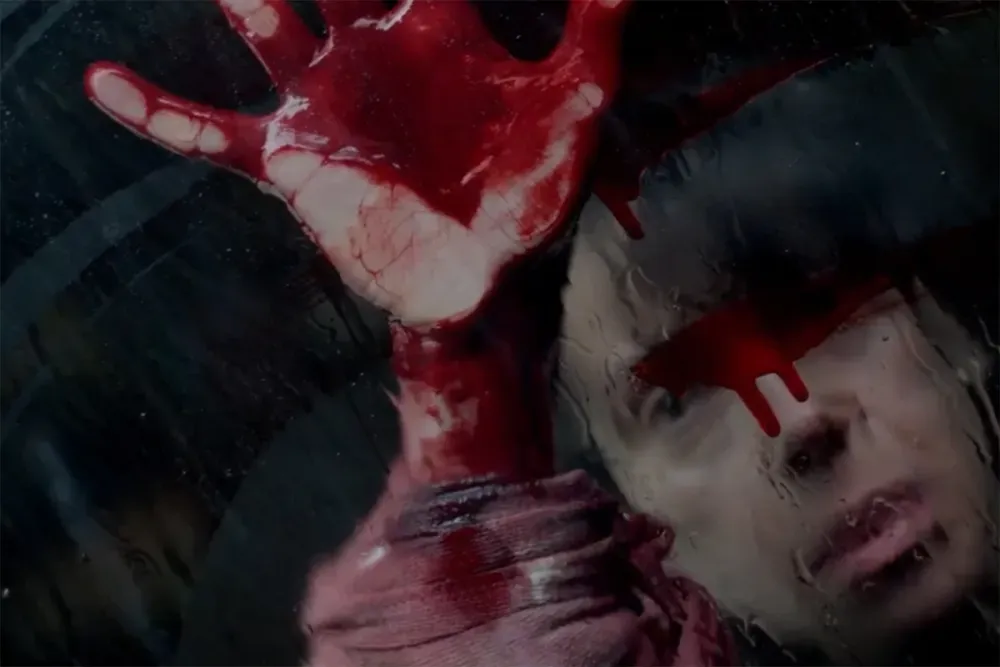In Review: 'The Phoenician Scheme,' 'Karate Kid: Legends,' 'Bring Her Back'
This week brings a new Wes Anderson, a pair of old sensei, and a really ill-suited foster mom.

The Phoencian Scheme
Dir. Wes Anderson
105 min.
Zsa-zsa Korda (Benicio del Toro) lives on the edge. An industrialist not afraid to get his hands dirty trading weapons in the easily inflamed world of mid-century Middle East and North Africa, he’s accumulated an enemies list that includes former trading partners, high-powered rivals, and even a member of his own family. When Korda survives an elaborate assassination attempt in the opening moments of The Phoenician Scheme, the new Wes Anderson film, it doesn’t come as that great of a surprise. More surprising: a brief glimpse of heaven that suggests he might be found wanting when he makes his eventual entrance through the Pearly Gates.
Heaven looks quite pearly, too; it’s shot in black-and-white, completing a trifecta of tips-of-the-hat to the Archers’ A Matter of Life and Death after the opening crash and Korda’s name, which he shares with Michael Powell and Emeric Pressburgers’ producer Alexander Korda. Yet given that the stakes are (probably) nothing less than a man’s soul, The Phonician Scheme never feels itself like a matter of life and death. It has all the usual pleasures of an Anderson film. Del Toro, returning to the Wes Anderson ensemble after his work in The French Dispatch, steps to the fore with a winning deadpan performance. Anderson’s technical precision and ability to create immersive storybook worlds remains unparalleled (though, given that no one else is even trying to make movies like this, that word might be inapt). Yet where other recentAnderson films like The Grand Budapest Hotel and Asteroid City build those storybooks around themes of loss and perseverance in the midst of bleak times, The Phoenician Scheme reveals little interest in such matters on first viewing. Its pleasures are almost entirely on the expertly appointed surface.
The Reveal is a reader-supported newsletter dedicated to bringing you great essays, reviews and conversation about movies. While both free and paid subscriptions are available, please consider a paid subscription to support our long-term sustainability.
They remain considerable, though. Two intertwined plot devices drive the film’s action: a family reunion and a potential financial crisis. Pained by his narrow escape, Korda decides to reunite with his estranged daughter Liesel (Mia Threapleton), a novitiate with no desire to leave the convent, and prepare her to take over his affairs. (Korda keeps a gaggle of sons nearby, but they seem unsuited for the task.) Liesel reluctantly agrees to hear her father out, her arrival coinciding with that of Bjørn (Michael Cera), a Norwegian entomologist who’s signed onto the Korda team as a tutor. When Korda promotes Bjørn to assist him, this unexpectedly turns into a mobile position. Korda, it turns out, finds he’s overextended himself when a price-fixing scheme threatens “the gap,” the rolling deficit created by his many in-progress projects (mostly ambitious construction projects with a light dusting of slave labor). Staying solvent means striking new deals with various contacts, a process that includes a lot of travel, the occasional basketball game, and a few generously dispensed hand grenades.
Anderson packs the film with delightful touches, from Cera’s accent work to Korda’s estate and its absurd masterpiece-filled collection of paintings to supporting characters played by Tom Hanks, Riz Ahmed, Bryan Cranston, Jeffrey Wright, Scarlett Johansson, and others. (As usual, the list goes on: Willem Dafoe, Hope Davis, Charlotte Gainsbourg, etc.) So what’s missing? There’s usually a moment in Anderson films in which everything snaps into place, revealing the weight that anchors the fanciful creation: F. Murray Abraham’s final scene in Budapest, Jeffrey Wright’s “solitary feast” reverie in The French Dispatch, Asteroid City’s balcony scene. If there’s an equivalent moment here, it eluded me. Everything surrounding where it should be is, as usual, a lot of fun, however. —Keith Phipps
The Phoenician Scheme opens in limited release today before expanding.


Karate Kid: Legends
Dir. Jonathan Entwistle
94 min.
At 94 minutes, Karate Kid: Legends isn’t a particularly long film, but consider the amount of work it takes just to get Ralph Macchio, the star of the first three Karate Kid movies and the TV series Cobra Kai, and Jackie Chan, the star of the 2010 Jaden Smith reboot of The Karate Kid, on the screen together. First, the film has to situate them in the same narrative universe, which The Karate Kid Part II inadvertently made easier in a scene where Pat Morita’s Mr. Miyagi shows young Daniel LaRusso (Macchio) has family dojo in Okinawa and the framed pictures of his ancestors on the wall, including the originator of Miyagi martial arts, who learned his craft in China. Adding a few more lines of dialogue to the original scene—seemingly via the cursed magic of AI, as Morita died in 2005—the film establishes a connection between the Miyagis and the Hans, who developed their own kung fu through the generations leading up to Chan’s Mr. Han.
As tortured as that sounds, it only wastes a handful of minutes, though they’re precious minutes, because they stall out the beginning of the film like Lucille LaRusso’s station wagon. The bigger problem is getting Han from Beijing to New York, where he comes to the aid of a former student, and Daniel from Los Angeles to New York, because he’s never met the student at all. (This is solved by Han arriving in New York for a few days, excusing himself from the dinner table, and then flying all the way to California and back.) Like so many franchises in our IP-addicted era, Karate Kid: Legends thoroughly exhausts itself on sorting out the mythology before it can gather its own momentum. The risk of not paying off on nostalgia may seem too terrifying, but Hollywood needs to listen to Mr. Miyagi: “It’s okay to lose to opponent. Must not lose to fear.”
Had it jettisoned the “Legends” part completely, this Karate Kid would not only have been a more efficient entertainment, but might have stood up reasonably well on its own distinct merits. The lion’s share of credit for that belongs to Ben Wang’s performance as the martial arts prodigy of the title, which is much more ebullient than Macchio’s hot-headed LaRusso, despite the near-identical situation of being a bullied new kid with a single mother who runs afoul of a sinister dojo. Despite the grief of losing his brother and following his mom from Beijing to a lonely block of New York, Li Fong (Wang) carries himself with a lightness that reflects his mentor, Mr. Han, who runs a kung fu school back home. As he struggles to make new friends, he starts hanging out a local pizza joint run by former boxer Victor (Joshua Jackson) and has promising chemistry with Victor’s daughter Mia (Sadie Stanley), whose ex-boyfriend (Aramis Knight) is less like Johnny Lawrence than Mike Barnes, the snarling “bad boy of karate” from The Karate Kid Part III.
Some plotting nonsense has Li training Victor to get back in the ring to fight off the debt he’s accumulated to mobbed-up loan sharks and later having to compete against Mia’s ex in a street-fighting championship that’s like the open-air, five-boroughs All Valley tournament. Director Jonathan Entwhistle, a British filmmaker whose chief credit is the fine Netflix series The End of the F***ing World, seems inclined to breeze through the contrivances of the story as quickly as possible in order to give Wang a chance to imitate a young Jackie Chan, who had to transcend stock material his entire career. Wang’s scenes with Stanley are sweet and flirty, and his legitimate proficiency in martial arts helps make the fight sequences credible. (You trust his big finishing move here could devastate opponents in a way that, say, LaRusso’s “Crane Kick” never would.)
But it’s the legends that hold Karate Kid: Legends back, despite Chan and Macchio making an amiable team as two varieties of the wise-old-timer type. There’s barely any guidance from either of them that help Li prepare for the tournament, certainly not enough to justify the effort in bringing them together. It may be a riskier play to cultivate Wang’s physical and comedic gifts and see if he can serve as a Jackie Chan type for 21st century Hollywood, but it’d be so much easier, too. In order to play it safe, Karate Kid: Legends has to twist itself into knots. — Scott Tobias
Karate Kid: Legends opens today in theaters everywhere.


Bring Her Back
Dir. Danny Philippou, Michael Philippou
104 min.
Rarely have softheartedness and meanness struggled as fiercely as they do in the films of Danny and Michael Philippou, the Australian brothers behind the 2023 horror film Talk to Me and the new Bring Her Back. The Philippous create teen characters so endearing and vividly realized that it’s awful to imagine bad things happening to them. Then, without fail, bad things happen to them, usually really bad things. Their movies stand at the opposite end of whatever spectrum has the Final Destination films at the other side. Those teens in those have seemingly been crafted to be annoying enough that it’s not a big deal, even welcome, when they get ground up in the movies’ meat-grinder machinations. When horror finds its way to the Philippous’ teens, it’s genuinely horrific.
The awfulness begins early for Andy (Billy Barratt) and his younger sister Piper (Sora Wong) when they find their father dead on a bathroom floor. This throws them into a foster care system that at first threatens to break them up, even though Andy’s just a few months shy of being able to apply to become Piper’s guardian. That the two are close and that Piper is vision impaired—she can see shapes and light but nothing more—makes the situation that much more difficult. Fortunately, they find a foster mother willing to take them in, one who’s familiar with the needs of the visually impaired having recently lost her own daughter with a similar condition. Unfortunately, said mother is Laura (Sally Hawkins).
Laura quickly makes Andy suspicious. She’s enthusiastic and nice but she also seems only interested in Piper, to whom she tells a lie, seemingly in jest, that Piper can’t detect because of her vision. Then there’s Oliver (Jonah Wren Phillips), the strange, mute, borderline fellow boy Laura’s already fostering. Her place has a creepy vibe, even if the new arrivals don’t see the videotapes Laura watches when they’re not around, which depict some kind of brutal ceremony (and eventually help explain the title). Laura’s attempts to turn Piper against her brother make it creepier still.
The more we learn about Laura, the harder it becomes to write her off as pure sadist. Bring Her Back’s empathy, helped along powerfully by Hawkins’ performance, extends even to her—at least up to a point. Yet the film sometimes does seem motivated by sadism. Andy and Piper suffer all manner of psychological abuse at Laura’shands even before the film takes a turn toward the truly grim. They’re sweet kids, endearingly brought to life by a pair of promising young actors, but Bring Her Back puts through the wringer again and again. That’s more a warning than a criticism, however. Two films in, the Philippous have built up a remarkable skill for creating uncomfortable situations and then pushing them toward their shocking extremes, however innocent those involved might be. To paraphrase another movie, they make hard worlds for little things. —Keith Phipps
Bring Her Back creeps into theaters tonight.





Discussion